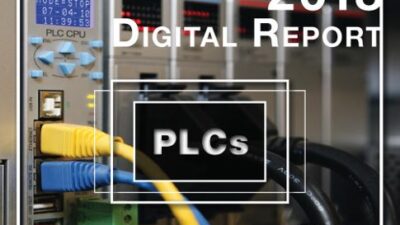Everett, WA; Holtsville, NY—Intermec Technologies Corp. reports that Symbol Technologies recently filed a lawsuit in Delaware alleging that Intermec infringed Symbol’s wireless communication patents. Intermec says it believes there is no basis for this lawsuit.
Everett, WA; Holtsville, NY— Intermec Technologies Corp. reports that Symbol Technologies recently filed a lawsuit in Delaware alleging that Intermec infringed Symbol’s wireless communication patents. Intermec says it believes there is no basis for this lawsuit.
Symbol reports that its lawsuit, filed in the U.S. District Court for the District of Delaware, relates to Intermec’s alleged infringement of Symbol’s patents covering wireless communications technologies. Symbol also has terminated its supplier relationship with Intermec for laser-scan engines. Symbol supplied Intermec with laser scan engines that Intermec embeds in its barcode scanning equipment. Symbol says it now believes it would be inappropriate to carry on such a commercial relationship with Intermec given the outstanding litigation between the two companies.
In its litigation, Symbol alleges that Intermec infringes Symbol’s patents relating to the wireless communications standard 802.11, also known as Wi-Fi. The lawsuit also covers Intermec’s use of Symbol Wi-Fi patents in Intermec’s barcode scanning terminals. Symbol is seeking a permanent injunction against Intermec’s use of Symbol’s patented technologies, and monetary damages for prior use. Symbol adds that two of the four patents in the lawsuit were found by a jury in the same court to be infringed by Proxim Corp.’s 802.11-compliant equipment, and that in September 2003, that jury ordered Proxim to pay Symbol approximately $23 million, based on a 6% royalty.
Symbol explainsto address these IP issues through a cross-licensing arrangement between the two companies, but its effort to reach a resolution was unsuccessful.
‘Symbol believes that Intermec’s imposition of its RFID IP on the industry is potentially harmful to the industry and customers. For months, Symbol has negotiated in earnest, seeking a fair business resolution. As we have a responsibility to our shareholders to protect and defend Symbol’s intellectual property, we believed there was no alternative but to file suit against Intermec,’ says Peter Lieb, Symbol’s senior VP and general counsel.
Intermec’s response
In response to Symbol’s accusations that it’s hindering market adoption of RFID, Intermec’s president, Tom Miller, says that, ‘Nothing could be further from the truth.’ The firm adds that it’s promoted and actively advanced RFID adoption and RFID standards-setting processes, while respecting intellectual property rights. For example, Intermec reports that it has:
-
Made five patents core to the practice of RFID available on a royalty-free basis to further adoption of EPCglobal Inc.’s Generation 2 standard.
-
Made 11 patents available on a reasonable and non-discriminatory basis to support adoption of the international RFID standard ISO 18000 6b.
-
Committed to providing industry access to its RFID patent estate. In fact, since the adoption of the Gen 2 standard in December 2004, Intermec adds that it has accelerated RFID licensing discussions with many potential licensees, including Symbol.
‘Intermec has gone to great lengths to negotiate an RFID licensing program with Symbol that is consistent with Symbol’s historical practices with respect to laser scanning and wireless licensing programs,’ adds Miller. ‘Symbol walked away from the negotiations in the apparent belief that it is entitled to customary terms and conditions for its intellectual property, but that Intermec is not entitled to the same.’
In addition, Intermec adds that Symbol’s decision to terminate their OEM agreement for laser-scan engines will have no impact on Intermec’s ability to supply laser-scan products, according to Miller. ‘I assure Intermec customers, partners, and the industry that Intermec is well-positioned to supply all scanning products, including lasers, indefinitely,’ he says. In fact, Intermec states that it has introduced non-infringing, barcode, laser-scanning technology, which is more compact and reliable, and offers longer product life than current barcode laser scan engines.
Intermec reports that Symbol’s breach of the OEM contract removes the covenant not to sue for patent infringement, and allows Intermec to enforce its data collection and smart battery patents. These are areas in which Symbol reportedly has substantial patent infringement exposure.
‘These types of disputes are not unusual in high-tech companies as new technologies are brought to market,’ says Miller. ‘Intermec looks forward to court involvement. It gives us the opportunity to demonstrate and sustain our technology leadership.’
Intermec adds that Symbol’s litigation is an apparent reaction to its own earlier RFID patent infringement lawsuit against Matrics Inc., which was filed in June 2004. The firm adds that Symbol knowingly acquired the lawsuit in September 2004 when it purchased Matrics. Intermec has charged that Matrics deliberately made and sold RFID products in the U.S. that were known to infringe Intermec’s RFID patents.
Symbol’s RFID response
‘While Symbol respects the rights of IP holders to obtain a reasonable return on their research and development investment, we also believe we have a responsibility to the industry and to our customers to fight a policy that could potentially be an onerous imposition of one company’s IP against the RFID industry. We believe Intermec’s RFID IP position, if allowed to stand, could thwart the overall development and wide-scale implementation of RFID, which would be detrimental to the industry and all users of advanced data capture technology,’ says Todd Hewlin, Symbol’s senior VP of global products.
Symbol adds that it and virtually all other industry participants other than Intermec are committed to a royalty-free RFID air interface. The air interface standard is the basis for broad adoption of RFID. The significance of the air interface standard is similar to the importance of bar code symbologies in the broad adoption of barcode technology. In the past, Symbol says it advocated for the wide adoption of bar code technology, and dedicated significant IP relating to bar code symbologies, particularly PDF417, a two-dimensional code, to the public to aid in standards and technology adoption.
‘Symbol supports the RFID standards organization’s position that it is critical for the RFID air interface to be royalty free. In contrast to the EPCglobal goal of having a royalty-free RFID air interface, Intermec has stated that companies will need Intermec IP in order to make commercially-viable RFID products,’ explains Hewlin. ‘Intermec has stated publicly that it is reserving the right to license its RFID technology on discriminating terms, and may refuse to license it altogether as it sees fit. This approach could significantly deter the widespread implementation of a compelling new technology. Ultimately, customers will suffer if RFID implementation is slowed by this type of IP assertion.’
Control Engineering Daily News Desk
Jim Montague, news editor
[email protected]


